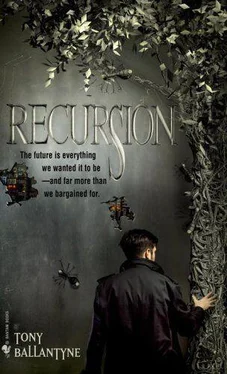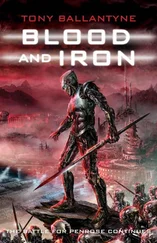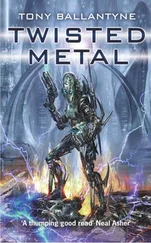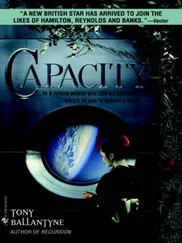“Still, everything looks okay at the moment. We’ve achieved a balance of sorts, so I think we’re ready to hit the planet’s surface.” He assumed a serious expression. “I’ll warn you now, we’re going to jump down there using the warp drive.”
“What?” Herb almost spilled coffee in his lap. “What if you miscalculate? A fraction of a decimal place out and we could end up slamming into the ground! Isn’t jumping directly down to a planet incredibly dangerous?”
Robert shrugged. “Normally I’d say yes. However, given our current circumstances, I think that a close proximity warp jump is the least of our worries.”
Down at Machine Level:
The entity known as Robert Johnston was far beyond what humans understood to be a personality construct. Unlike the crude copies of itself that had been sent out into the linear and pseudo parallel processing spaces of the Enemy Domain, the personality construct resident in the robot body was of a super parallel non-Turing design that human minds could not begin to comprehend. Its like was not scheduled to be seen in human space for at least another two hundred years.
Super parallel non-Turing: in other words, Robert Johnston could think about many things at once.
To Robert Johnston, reality was a series of interlocking layers. At the moment, for example, he could see the dissipating warp field still shimmering around the ship yet well below the threshold that would cause anomalies for anything crossing the boundary into normal space.
Another part of him had interfaced with a minor security net on the planet which saw the universe as a three-color array of threats, friends and undecideds. That particular Robert was busily engaged in slotting the ship into the “friends” column.
Part of Robert Johnston could even see the world through eyes similar to Herb’s.
Using those senses, its robot body appeared to be sitting in a warm patch of sunlight cast by the ceiling viewing fields. Robert called this a human view. Such a slow view. Herb sat opposite him, anxiously looking from viewing field to viewing field with the speed of a snail in aspic.
And then there was that other way of looking at humans…
Robert Johnston could see Herb as a pattern of feelings and emotions that even Herb himself was not always aware of. He read the tension evident in his shoulders as a standing wave of electrical impulses, heard the fear in his chest by the rapid pattern of his heartbeat.
He could look deeper. He saw how, as Herb gazed around at the friendly warmth of this new planet, he was for a moment taken back to that day, weeks ago, when he had boarded his spaceship to make the return journey to his converted planet. Herb was feeling a strong wave of something almost like nostalgia. Not just a wish to be home, safe, but something more: a realization that if he had his time over again, his life could be so much better.
In the middle of the battle, Herb was having a sudden insight into what a mess he had made of his life so far; how much of a waste it had been.
It was the emotion that Robert had been waiting to read in Herb. One that he had been leading him toward for the past eleven days.
Directly below the ship, a river of blue-grey machines crawled along a rocky channel. A seemingly never-ending parade of shuffling, stumbling cylinders being funneled through the U-shaped valley that ran in a straight line from horizon to horizon. One aspect of Robert Johnston guided his robot body to pick up the Mцbius VNM it had shown Herb earlier and then throw it out of the ship’s hatch to land in the parade of machines that crept through the valley underneath.
While one part of his consciousness examined the structure and command systems of the machines below, another part explained to Herb, with painful slowness, the methods by which those machines would eventually terraform the planet across which they marched. On one level of reality Robert Johnston was examining the bacteria-tailoring factories that would build the soil for the planet, on another level he was explaining to Herb how the creeping machines would eventually form a circle around the planet to act as a heat pump, and on yet another level Robert Johnston was watching the Mцbius machine that his robot body had just thrown from the ship. The machine righted itself and took a couple of stumbling steps forward, but was gradually dragged down by the slow, inevitable movement of the creeping machines. It reappeared for a moment, bobbed up above the backs of the machines, once, twice, and then was gone.
The hatch slid shut.
Herb had noticed that two of the blue-grey machines from the planet below were now sitting motionless on the hatch.
“What are they for?” he asked.
“They’re for later,” said Robert, oh so slowly, while at the same time he reconfigured the thickness of the ship’s bull, making the stern slightly thicker than the nose. After all, the stern was catching most of the explosions.
He told the ship to ascend.
Herb’s world was so slow…Robert knew what Herb was about to say before Herb did, and yet Robert still had to sit and listen to the end of each sentence. It was important. Not to do so would be unsettling for the young man.
“Your machine didn’t work,” said Herb. The words moved at glacier speed. Robert already had the reply slotted in place, ready to play, while another part of his attention completed the analysis of the Ouroboros machines below.
“Patience,” said Robert. “These terraformers are faster at reproduction than those on the last planet. Give it time and my Mцbius machine will make enough copies of itself to be able to twist that loop around and reverse the terraforming process.”
“Oh,” said Herb. The ship was accelerating away from the planet’s surface again, getting ready for another jump. Robert could see the thought occurring to him. He knew what Herb was going to say next.
“Why are we stopping the terraforming of that planet? Surely terraforming is a good thing?”
“Only if you’re a human. Not everyone in the galaxy is,” replied Robert. “Jump in ten seconds…”
And then most of the ship’s propulsion system vanished.
In an instant all of Robert Johnston’s attention was directed to trying to keep the ship aloft.
There wasn’t enough of the propulsion system left to do that.
The ship was falling back toward the planet: impact in 13.2081177 seconds.
The ship’s self-repair systems came on line. They were fast, but not fast enough. Impact would still occur, now in 26.1187722 seconds. Robert Johnston added some of the nanotechs he carried in his own robot body to the ship. The reinforcements were enough to help the repair system complete its immediate task. The ship’s fall was halted: impact in (indefinite) seconds.
Now Robert split his awareness in two. Part of it continued to oversee the repairs; a larger part was directed to discovering what had happened.
He ran through the ship’s internal monitoring records and replayed the last three milliseconds before the propulsion system had vanished.
There was the answer. The ship had fallen victim to a stealth attack. Somehow the local security net had got a set of nanotechs onto the hull. That should have been impossible, given the defense routines Robert had set up, but even more incredible was the fact that the nanotechs had managed to do so without being noticed. They had worked their way into the propulsion system, making themselves into exact copies of existing parts. When they had converted enough of the system, they just…dissolved.
Читать дальше












